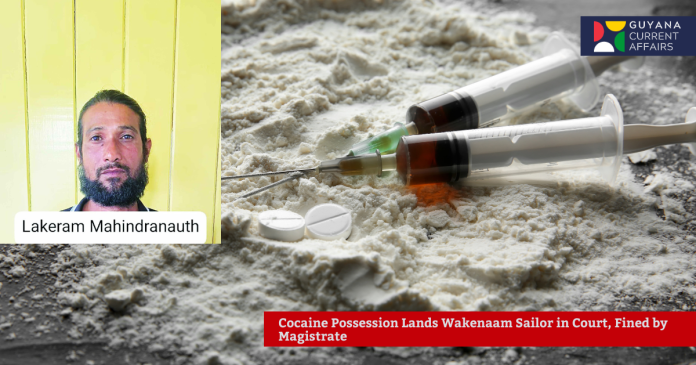A sailor from Wakenaam, Essequibo River, was fined $30,000 after pleading guilty to cocaine possession in a case that underscores both the reach of Guyana’s drug enforcement efforts and the ongoing challenges posed by narcotics use in riverine communities.
Incident Details and Court Proceedings
Lakeram Mahindranauth, known as ‘Vishan’, 42, of Lot 108 Maria’s Pleasure, Wakenaam, was charged with possession of 0.81 gram of cocaine. The case was heard at the Charity Magistrate’s Court on April 14, 2025, before Magistrate Tamieka Clarke. Upon the charge being read, Mahindranauth immediately pleaded guilty, opting not to contest the allegations against him1.
The court imposed a $30,000 fine on Mahindranauth, with a default sentence of one month’s imprisonment should he fail to pay. The relatively small quantity of cocaine found in his possession meant the charge did not escalate to trafficking, which would have carried far more severe penalties.
Context: Drug Use and Enforcement in Riverine Communities
Mahindranauth’s case highlights the persistent issue of drug use and possession in Guyana’s riverine and rural areas. Wakenaam, an island in the Essequibo River, is a community where economic opportunities are often limited, and residents like Mahindranauth, who work as sailors, may be vulnerable to involvement in drug-related activities.
Guyana’s law enforcement agencies have maintained a strong stance against narcotics, conducting regular patrols and surveillance even in remote regions. The Charity Magistrate’s Court, which serves the Essequibo Coast and outlying islands, has seen a steady stream of drug-related cases, reflecting both the prevalence of the issue and the authorities’ commitment to prosecuting offenders.
Legal Framework and Sentencing Trends
Under Guyanese law, possession of any amount of cocaine is a criminal offense. The severity of the penalty typically depends on the quantity involved and whether there is evidence of intent to traffic. In Mahindranauth’s case, the 0.81 gram found was well below the threshold for trafficking charges, allowing for a fine rather than mandatory imprisonment1.
Courts often exercise discretion in sentencing for small-quantity possession, especially when the accused pleads guilty and there is no evidence of prior offenses or aggravating circumstances. However, the default imprisonment clause ensures that penalties remain a deterrent even if the offender is unable to pay the fine.
Broader Implications and Community Impact
The case serves as a reminder of the ongoing social and economic challenges faced by communities like Wakenaam. Drug use, even at the level of personal possession, can have ripple effects—contributing to cycles of poverty, health issues, and further criminal activity.
Authorities continue to urge residents to avoid involvement with narcotics and have called for increased community engagement, education, and support services to address the root causes of drug use. Meanwhile, the legal system’s response—swift prosecution and clear penalties—aims to reinforce the message that drug possession will not be tolerated, regardless of the quantity or location.
As Guyana continues to develop its economy and infrastructure, addressing the underlying factors that lead to drug use and possession remains a priority for both law enforcement and community leaders.


